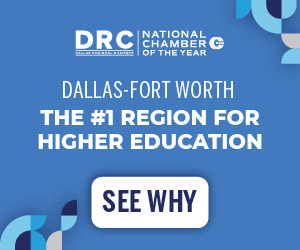![]() Every week, we pore through press releases and websites doing a little research of our own. We’re looking for scientists, professors, engineers, entrepreneurs—anybody, really—engaging in research and development across North Texas.
Every week, we pore through press releases and websites doing a little research of our own. We’re looking for scientists, professors, engineers, entrepreneurs—anybody, really—engaging in research and development across North Texas.
There’s plenty of good work being done. If you want to put R&D under your microscope, sign up for our e-newsletter.
Research team aims to find better mobility options for people, cargo
An all-star team of researchers that includes Dallas Fort Worth International Airport is working to find mobility options for people and cargo that maximize energy, but save time and money at the airport.
DFW Airport’s personnel is part of a team being led by the U.S. Department of Energy National Renewable Energy Laboratory — the primary national laboratory for energy research and development — and also includes Oak Ridge National Laboratory.
“Although we are focusing initially on DFW, we expect the models and methodologies to be adaptable to other airports and transportation hubs across the country.”
Caleb Phillips
The Department of Energy’s Vehicle Technologies Office provided a $5 million award for the research, according to a report in Transportation Today.
Transportation Today said the laboratories will use their data sciences expertise and computing capabilities to produce models of current and future behaviors based on real-world data from DFW Airport and its transportation partners.
“By helping the nation’s transportation hubs model possible future scenarios, these insights will help them navigate the rapidly emerging energy-efficient technologies that will change mobility plans for years to come,” NREL senior scientist Caleb Phillips said. “Although we are focusing initially on DFW, we expect the models and methodologies to be adaptable to other airports and transportation hubs across the country.”
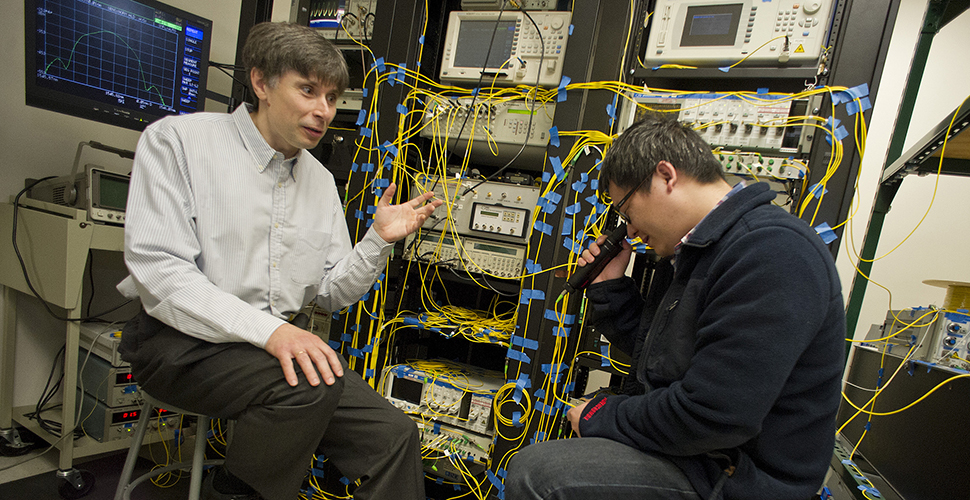
UTA professor Michael Vasilyev, left, is using an NSF grant to address the challenges of large-scale deployment of quantum communication systems by developing chip-integrated devices and sub-systems for preparation and detection of quantum photonic signals. [Photo Courtesy Uma]
UTA scientists get $750K for quantum communication project
Two University of Texas at Arlington professors have received a three-year, $750,000 grant from the National Science Foundation to take on the challenges of the large-scale deployment of quantum communication systems.
After all, distributing information via quantum communication — a new field in applied quantum physics — is a very secure way to transmit data because it relies on the quantum nature of single photons, the fundamental particles of light, to make it impossible for someone to eavesdrop and steal information, UTA said in a release. But deployment on a large scale isnt’ easy, and quantum communication is slower than traditional means of communication, the university said.
The grant is part is part of $31 million that the NSF has awarded for fundamental quantum research.
That’s where Michael Vasilyev, a professor of electrical engineering, and his research partner, Yuping Huang of the Stevens Institute of Technology enter the picture. The grant is part is part of $31 million that the NSF has awarded for fundamental quantum research, UTA said in the release.
Some $6 million of that funding was earmarked for eight projects like Vasilyev’s that enable scalable quantum communications systems by demonstrating proof-of-concept technologies that encompass novel devices, circuits, information processing techniques, and integration platforms in a quantum communication system, the National Science Foundation said.
For this grant, the researchers will integrate linear and nonlinear optical devices on a lithium-niobate thin film platform, UTA said, That will make it possible to shrink a whole system to a single chip and enable fast, robust, and photon-efficient quantum communication over both traditional telecom fibers and free space.
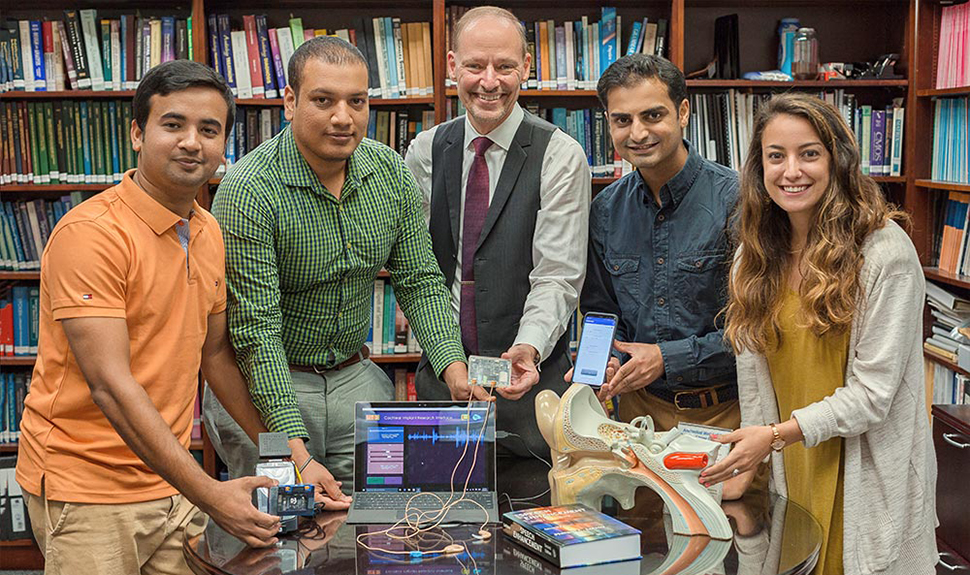
From left: Research assistant Nursadul Mamun, teaching assistant Ram Charan Chandra Shekar, Prof. John Hansen, senior research scientist Hussnain Ali, and research assistant Juliana Saba show off the tools in their CCi-MOBILE project. [Photo Courtesy UT Dallas]
UTD researcher gets $3.2M grant to improve cochlear implants
A professor at the University of Texas at Dallas has received a $3.2 million grant from the National Institutes of Health to develop sound processing algorithms that could improve cochlear implants.
Dr. John Hansen, who received the grant, is professor of electrial and computer engineering at UT Dallas.
“Losing your hearing disconnects you from family, friends and society.”
John Hansen
“Losing your hearing disconnects you from family, friends and society,” said Hansen, who holds the Distinguished Chair in Telecommunications in the Erik Jonsson School of Engineering and Computer Science. “That’s why we need to make sure we are providing the best hearing devices we can.”
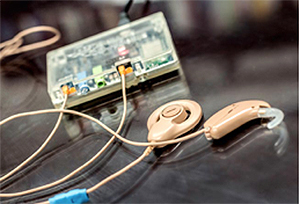
CCi-MOBILE is a mobile research platform that allows researchers to “test-drive” audio processing algorithms in the laboratory or in natural settings where implant users face the most challenges. [Photo Courtesy UTD]
In a release, UT Dallas said the devices consist of an external microphone and processing unit that are connected by a magnetic coil to a second unit that is surgically implanted under the skin behind the ear. The implant translates sound from the external unit into electrical signals that stimulate nerve cells in the cochlea in the inner ear. Then, those signals make their way into the brain as sound and speech, UT Dallas said.
Hansen and colleagues at the Center for Robust Speech Systems-Cochlear Implant Lab (CRSS-CILab) have created CCi-MOBILE, a mobile research platform that allows researchers to in-effect “test drive” new audio processing algorithms in the laboratory or in natural settings where implant users face the most challenges.

The Acolytes of Apollo: Arianne Scheller, Alexis Quintana, Miranda Moore, faculty adviser Rhett Rigby, Charles Swieczkowski, Audra Romans and Curt Neeld. [PHoto Courtesy TWU]
TWU kineseology team to compete in space-related competition
A team from the Texas Woman University Kinesiology department are about to launch a new chapter in the school’s competitive history — competing No. 12 in The TSGC Design Challenge, a project competition that supports space travel.
Sponsored by NASA and administered by the Texas Space Grant Consortium (TSGC), the competition in Houston challenges teams to find solutions to engineering and technical issues related to long-distance space travel.
“Low back pain can significantly impact space flight mission success.”
Curt Neeld
TWU doesn’t have an engineering department, but will compete this year because the Consortium opened the competition to health sciences.
TWU said in a release that faculty adviser Rhett Rigby, assistant professor of health promotion and kinesiology, hand-picked the team of six senior kinesiology students who spent the summer studying musculoskeletal issues experienced by astronauts while in flight. Nicholas Levine, a doctoral student who specializes in biomechanics, helped the team — called The Acolytes of Apollo — narrow its research to prevention, mitigation, and treatment of lower back pain caused by microgravity.
“Low back pain can significantly impact space flight mission success,” team lead Curt Neeld of Tioga, Texas, said in the release. “In fact, our analysis shows it is the musculoskeletal injury with the highest incidence detailed in NASA’s records of in-flight medical conditions. As we are primarily pre-physical and pre-occupational therapy students, we decided to address this from a rehabilitative perspective.”
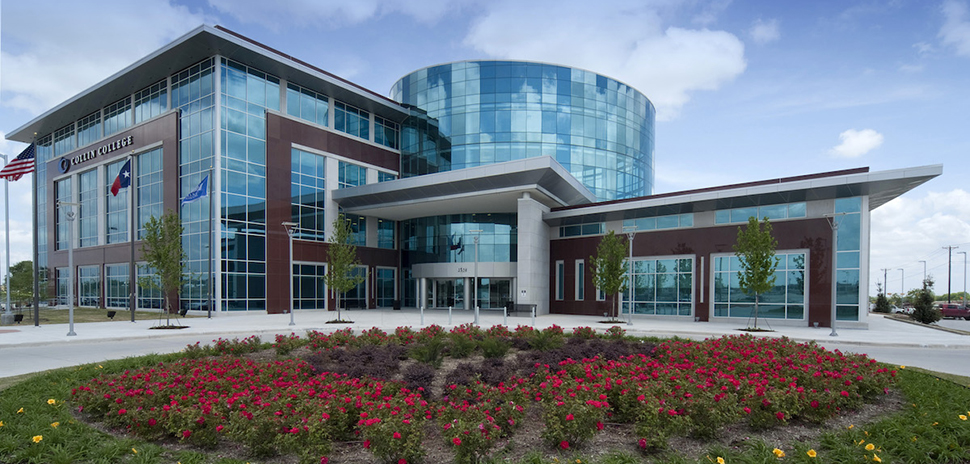
Collin College will lead an NSF project on Information Technology Skill Standrads under a $3.7 million grant. [Photo Courtesy Collin College]
Collin College gets $3.7M grant for Information Technology Skill Standards project
The National Science Foundation has given a four-year, $3.7 million grant to Collin College, which will lead the organizaton’s national project, Information Technology Skill Standards, 2020 and Beyond.
It’s quite a coup for Collin College, which is teaming with educational partners nationwide. Collin College said the grant will address the need for more IT workers and will generate up-to-date skill standards.
“The pipeline funneling workers into information technology jobs is far too narrow, and we simply do not have enough employees to meet the growing demands of this field.”
Ann Beheler
According to a press release, the project will enable curriculum development for two-year and four-year institutions that offer applied information technology degrees. It also will benefit smaller employees in helping them identify talent, the release said.
“The pipeline funneling workers into information technology jobs is far too narrow, and we simply do not have enough employees to meet the growing demands of this field,” Ann Beheler, Collin College’s executive director of emerging technology grants, said in the press release. “It is an honor to be selected to lead this NSF grant, which will enable us to focus on the technical content and employability skills that industry needs and serve as a liaison disseminating that information nationally to two-year and four-year educational institutions.”
At least 400 subject matter industry experts will be involved in the project, as well as more than 200 educators selected nationally, the release said.
READ NEXT
![]()














